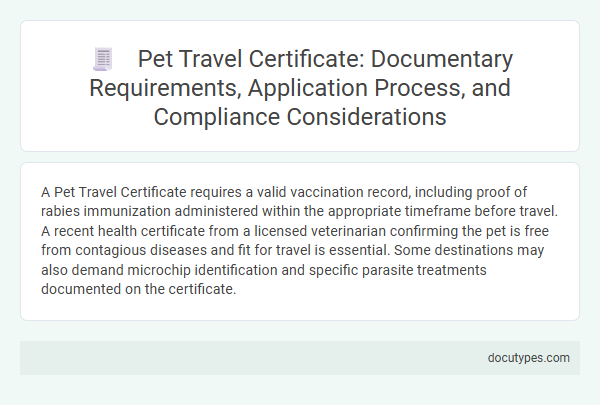A Pet Travel Certificate requires a valid vaccination record, including proof of rabies immunization administered within the appropriate timeframe before travel. A recent health certificate from a licensed veterinarian confirming the pet is free from contagious diseases and fit for travel is essential. Some destinations may also demand microchip identification and specific parasite treatments documented on the certificate.
Understanding the Pet Travel Certificate: Purpose and Importance
The Pet Travel Certificate is an essential document required for transporting pets across international borders. Its purpose is to certify that your pet meets all health and regulatory standards for safe travel.
- Health Verification - Confirms that your pet is free from contagious diseases and has received necessary vaccinations.
- Regulatory Compliance - Ensures adherence to destination country laws and quarantine requirements.
- Travel Safety - Provides proof that your pet is fit and safe for travel, minimizing health risks during transit.
Understanding the importance of the Pet Travel Certificate helps you avoid travel delays and guarantees a smooth journey for your pet.
Key Documentary Requirements for Pet Travel
Traveling with pets requires specific documentation to ensure their safety and compliance with regulations. Key documentary requirements for a pet travel certificate include proof of vaccination, health status, and identification details.
You must provide a valid rabies vaccination certificate, which is crucial for international travel. A recent health certificate from a licensed veterinarian confirms your pet is free from contagious diseases. Microchip information or a similar form of identification is often necessary to verify your pet's identity during transit.
Required Vaccinations and Health Records
What are the required vaccinations for obtaining a pet travel certificate?
Pets must have current vaccinations, including rabies, to qualify for a travel certificate. Vaccination records should be up-to-date and verified by a licensed veterinarian.
What health records are necessary for a pet travel certificate?
Complete health records detailing the pet's overall health and recent veterinary check-ups are essential. These documents help confirm that the pet is free from contagious diseases before travel.
Microchipping and Animal Identification Standards
| Requirement | Description | Standards and Regulations |
|---|---|---|
| Microchipping | Pets must be microchipped with a unique identification number before travel. The microchip provides a permanent method of identification, essential for verifying the pet's identity during border inspections. | ISO 11784/11785 compliant microchips are generally required. Microchips must be implanted before or at the time of rabies vaccination to ensure proper linking of vaccine records. |
| Animal Identification Standards | Identification must meet international standards to confirm the pet's identity across countries. Proper identification reduces the risk of lost or misidentified animals during transit. | Identification standards include ISO 11784 for microchip data structure and ISO 11785 for the transmission protocols. Some countries may require additional visible identification such as tags or tattoos depending on local regulations. |
Application Process for Obtaining a Pet Travel Certificate
The application process for obtaining a pet travel certificate requires submitting specific documentation to the relevant veterinary authority. This procedure ensures that pets meet all health and safety standards for international travel.
- Identification documents - Provide the pet's microchip or tattoo details for proper identification.
- Health records - Submit vaccination history, including rabies vaccination certificates validated by a licensed veterinarian.
- Veterinary examination - Undergo a health check by an accredited veterinarian within a specified time frame before travel to certify the pet is fit to fly.
Timeline and Processing Duration for Certificates
Obtaining a pet travel certificate typically requires submitting proof of vaccinations, health examinations, and identification documents within a specific timeframe before travel, usually 7 to 30 days. The processing duration varies depending on the issuing authority, commonly taking between 3 to 10 business days. Planning ahead is crucial to ensure all documentation is approved and ready prior to the pet's departure date.
Country-Specific Regulations and Destination Compliance
Pet travel certificates require specific documentation that varies based on your destination country. Understanding these country-specific regulations ensures a smooth entry for your pet without delays or complications.
Common requirements include vaccination records, microchip identification, and a health certificate issued by a licensed veterinarian. Some countries demand additional tests or quarantine periods to comply with their animal import laws.
Airline and Carrier Compliance: Documentary Expectations
Pet Travel Certificates are essential for ensuring your pet's journey complies with airline and carrier policies. These documents verify health status and vaccinations, meeting strict airline standards.
- Health Certification - Airlines require an official veterinary health certificate confirming your pet is free from contagious diseases before travel.
- Vaccination Records - Proof of up-to-date vaccinations, especially rabies, must be included to satisfy carrier regulations and destination country rules.
- Carrier-Specific Documentation - Different airlines may have unique forms or endorsements that must be attached to the pet's travel certificate for acceptance.
Common Mistakes to Avoid in Pet Travel Documentation
When preparing a pet travel certificate, ensure all vaccination records are up-to-date and clearly documented to avoid delays at customs. Avoid submitting incomplete or incorrect microchip information, as this is a common mistake that can result in denied entry. Double-check that the certificate is issued within the required timeframe specified by the destination country to prevent invalid documentation issues.
What Are the Documentary Requirements for a Pet Travel Certificate? Infographic

